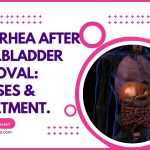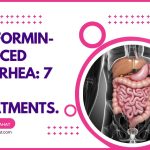Feeling Sick (Fatigue) & Diarrhea after eating: 5 Main Causes Explained.
Our content is not intended nor recommended as a substitute for medical advice by your doctor. Use for informational purposes only.
1 . Irritable Bowel Syndrome.
Irritable bowel syndrome is a functional bowel disease. No obvious cause or lesions can be detected in IBS, which is why it is called (functional).
IBS is a widespread condition affecting 10-15% of people worldwide. IBS causes attacks of abdominal pain during which your stomach keeps gurgling.
Also, IBS is linked to chronic fatigue and chronic pain syndromes such as fibromyalgia, and that’s why IBS may make you feel sick during the attacks (reference).
According to ROME IV criteria for IBS diagnosis, IBS is considered when:
- Abdominal pain: You will feel a “crampy” sensation that is variable in intensity.
- The pain usually is related to bowel movements. Commonly, it decreases or disappears after defecation.
- In a small subset, the pain may increase after bowel movements.
- Altered bowel habits: periods of either constipation or diarrhea or alternating constipation and diarrhea.
- To diagnose IBS, You should experience stomach pain consistently for a long period. The pain should come at least a day per week for several months.
- Bloating and stomach gurgling are common with IBS (although not included in the Rome criteria).
2. Food allergy and intolerance.
Food intolerance is more widespread than you think. Up to 20% of people have a food intolerance, and most don’t know they have it.
Food intolerance is difficulty digesting certain types of food. The most widespread type of lactose intolerance (lactose is a sugar found in milk and dairy products).
The intolerance often results in a deficiency or a defect in the digestion or absorption of certain types of food or food constituents. As a result, food accumulates inside your digestive system and causes symptoms such as stomach gurgling and sickness.
Food allergy is another food reaction that causes stomach gurgling and a sick feeling. Food allergy is different from food intolerance.
An allergy is an immune-mediated response to a food that can cause more severe symptoms. The symptoms of food allergy are not confined to your gut. Extraintestinal allergic conditions such as skin rashes also develop.
Consult your doctor or dietitian if your stomach keeps gurgling or you feel sick after consuming certain foods or drinks.
The summary and differences between food intolerance and food allergy are in the table below:
| Food intolerance | Food allergy |
| Affects 15-20% of the population | Affects nearly 2-5% of adults |
| Difficulty digesting certain types of food (not immune-mediated allergy). | An immune-mediated reaction to certain foods or food components. |
| Causes “recurrent acute” or “chronic” attacks of diarrhea | Usually causes acute attacks related to the ingestion of offending food. |
| Intestinal symptoms: diarrhea, extensive gas, bloating, and abdominal pain, stomach gurgling. | Intestinal symptoms are the same |
| No extraintestinal symptoms | Extraintestinal symptoms include rashes, urticaria, swollen lips or face, fever, sickness, or severe life-threatening allergic reactions. |
| The severity of your symptoms is proportional to the amount you eat from the offending food. | Even trace amounts of the offending food can produce severe symptoms. |
Common offending foods:
| Common offending foods: (examples)
|
RELATED: What happens if you ignore lactose intolerance?
3. Dumping syndrome.
Dumping syndrome is often a side effect of previous abdominal surgeries such as:
- Gastric bypass surgery.
- Different types of bariatric surgery (weight loss surgery).
- Remove a part of your stomach for any reason (such as tumors or perforated ulcers).
- Esophageal surgery.
Stomach dumping is a rapid emptying of your stomach (often due to decreased stomach capacity).
The rapid emptying results in rapid movement of stomach content into your intestine producing:
- Diarrhea after eating or drinking anything, including water.
- Feeling full after eating very little.
- Sudden onset of colics after eating or drinking. It only resolves after passing the stool.
- Flushing, dizziness, and lightheadedness shortly after eating.
- Fast heartbeats after eating.
The condition rarely occurs in patients without stomach operations. We diagnose dumping syndrome by a specific test called (scintigraphic gastric emptying study). Learn more about gastric emptying studies.
4. Acute and chronic Gut infections.
We are discussing the causes of chronic abdominal pain and diarrhea. Acute diarrhea and abdominal pain are almost exclusively caused by infection and food-borne illnesses (food poisoning).
However, infections can also lead to chronic diarrhea and abdominal pain.
Common causes of chronic gastrointestinal infections that lead to diarrhea and stomach pain:
- Closteroides are difficult infections.
- Protozoa: Chronic giardiasis, cryptosporidia, cyclosporine.
- Yersinia bacteria.
Features suggesting chronic infection:
- Chronic abdominal pain and diarrhea. Eating can cause more diarrhea; however, diarrhea may continue even if you stop eating.
- Fever may occur. It is usually low-grade in chronic infections.
- Mucus or blood in the stool.
- Weight loss and fatigue.
- Diarrhea and stomach pain after eating is usually continuous rather than intermittent.
- Nausea.
- Malaise and muscle aches.
- Fatty or greasy stool (especially with chronic giardiasis).
Your doctor will require some tests to diagnose the cause of infections. Commonly, stool analysis and stool culture.
5. Celiac disease.
Celiac disease is considered a form of food allergy. It affects about 1% of people. Celiac disease is an immune-mediated reaction to a protein found in wheat, rye, and barely called (gluten).
Gluten protein destroys the lining cells of your intestine that are responsible for food absorption. The destruction leads to symptoms such as:
- Chronic diarrhea (not in all cases).
- Bloating and gas (your stomach keeps gurgling whenever you eat gluten).
- Nausea and vomiting.
- Fatigue and severe iron deficiency anemia (a feeling of being sick always).
- Abdominal colics.
- Weight loss.
- Sometimes, constipation can also occur.
6. Chronic stress and anxiety.
Chronic inflammation of the pancreas leads to the destruction of pancreatic tissue. In addition, a deficiency of pancreatic digestive enzymes leads to stomach pain and diarrhea after eating.
The condition of impaired pancreatic function is called exocrine pancreatic insufficiency or EPI (reference).
Often, chronic pancreatitis follows a previous attack of acute pancreatitis.
Features suggestive of chronic pancreatitis and EPI:
- Pain in the upper-middle part of your abdomen.
- The pain is usually more severe and constant. It doesn’t respond to traditional OTC antispasmodics and stomach medications.
- Diarrhea after eating (especially after eating fatty foods).
- Oily or greasy stool.
- Nausea and vomiting.
7. Others
- IBD
- Premenstrual syndrome.
- SIBO
- Thyroid diseases.
- Chronic pancreatitis.
- Chronic disease and illnesses.
- Anemia.
- Drugs.
- GI cancers such as colorectal cancer and neuroendocrine tumors.
- Evidence-based
- Written by a doctor.

Related Posts:
- 5 Main Causes of Throwing up Feeling after Eating…
- Bloated as Pregnant? 6 Main Causes & Treatments.
- 5 Main causes of abdominal pain and blood in the urine
- Clear Urine with Bubbles: 6 Main Causes & When to Worry
- Tea-colored Urine: 5 Main Causes & When to Worry
- Marked Alkaline Phosphatase Elevation (levels over…





